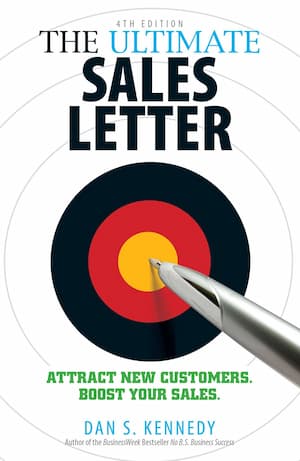What is copywriting?
This is the shortest answer to the question what is copywriting:
Copywriting is words that sell.

Copywriting is what marketers and advertisers use when they want to sell their product or service. Copy is the words. Writing is arranging those words. And those words could be read on the page (or screen) or heard (like in a video script).
Anyone who writes words intended to persuade is copywriting. But when it matters whether the reader is convinced, it’s worth getting a professional copywriter.
[toc]
The purpose of copywriting
Wherever the copy is found, copywriting has one purpose: to persuade the reader (or listener) to take action. So if you have a call-to-action, you need copywriting to get the reader to take the action.
The call to action in your written content could be anything. It could be buying, clicking a link, calling you, scheduling a meeting, running 5k…
Whatever the action, getting the reader to take the action requires getting them to feel, think and respond. That’s the copywriter’s job.
What is direct response copywriting?

Direct response copywriting is a three-word way of saying “copywriting”. That’s because all copywriting is direct response copywriting because all copywriting wants the reader to respond.
If you’ve ever visited a website and booked a call or downloaded a PDF, the copywriting has worked its magic on you. You have responded directly to the copy. If an ad has sent you to a landing page, you’ve seen direct response in action.
And you’ll know you’ve responded directly because you’ll have done it after seeing a call to action. That call to action told you exactly what the business wanted you to do next.
What is copywriting in marketing?
Marketing material is material designed to sell a product or service. Copywriting is the words in that material. That includes words you read and scripts for ads and videos. It’s the sales letters you get through the post.
Copywriting skills are often the difference between marketing spend showing a return and going to waste.
What is copywriting in digital marketing?
Digital marketing is just marketing, but online content might just need even more written content than other forms of marketing. All those websites, landing pages, sales pages, LinkedIn posts, YouTube videos and PDF downloads…
If they need to be persuasive, they need copywriting.
What copywriting is NOT
Copywriting is not about fooling people. Copywriting is about connecting people with the products and services that they need.
Fooling people is a short-term tactic and doesn’t benefit anyone in the long run.
The difference between a professional copywriter and a content writer

Content marketing has been around for a long time; it predates the internet. The Michelin Guide, for example, is an example of content marketing. And it proves the value of this kind of marketing.
However, only words intended to persuade a reader into action can be called copywriting. There are other kinds of valuable words, but they aren’t copywriting.
What a content writer does
A content writer is who you need to keep your customer up to date, informed, and entertained. An article about trends in your industry is content writing. A Facebook post about your opening hours is content writing.
But there are calls to action in my content
Your article, white paper or social media posts might contain an element of copywriting. In the blog post, that element would be the part when you asked the reader to contact you for more information. In the social media posts, it would be the part where you suggest the reader books an appointment.
However, an 800-word newsletter about changes in legislation is not copywriting because the final paragraph suggests a consultation. Your white paper about online learning isn’t copywriting because you put your phone number on it.
Content marketing’s ability to educate and inform moves customers down the sales funnel. Copywriting closes the deal. Learn more about content writing.
What about SEO copywriting?

SEO stands for search engine optimisation. Simply put, search engine optimisation is the skill of getting ranked at the top of Google or other search engines.
SEO copywriting is (basically):
- Keyword research: Finding the searches your prospects make when looking for someone like you
- Crafting copy for web pages, blog posts and other content about that search
At that point, the baton passes to whoever is doing your technical SEO. Technical SEO is everything else that goes into trying to rank a page. That includes many factors like how your site is structured, how fast it loads and how many other sites point to it.
Copywriting vs SEO copywriting
Copywriting aims to get a human to take an action. SEO copywriting aims to get Google to take an action — put your business on the first page. (And other search engines, too. Believe it or not, they exist.)
Better search engine rankings mean more traffic. More traffic means more sales if those visitors meet relevant content and effective copywriting.
What are the benefits of copywriting?
When copywriting works, you get action from your readers. Those actions are either sales or steps the target audience is taking on the way to buying.
That’s not the only benefit of copywriting, however.
The curse of knowledge

Sometimes a business owner or marketing manager is too close to the business. There are things they’ve stopped seeing. There are new things to see. Having an outsider asking lots of “stupid” questions can be refreshing. And skilled copywriters aren’t afraid to ask stupid questions.
Also, you’re probably more of an expert in your service or products than your ideal customer. You naturally fill your writing with terminology that’s not common in your customer’s world. You know so much that you start too far ahead of your customer’s knowledge.
This is where professional copywriters come into play. They can simplify the complicated. Simplicity creates understanding, understanding builds confidence and confidence increases the likelihood of buying.
What are professional copywriters?

A copywriter is a person behind the words that can make or break a business.
Without a great writer, a business might not have any customers if it relies on its web presence, Facebook ads, mail drops or other marketing that isn’t face-to-face. That puts the writer on the hook for making sure their copy sells products and services.
A content writer can put down the pen after explaining what the product or service does or how to use it.
What businesses need to know about copywriters
Many businesses don’t know what a copywriter is. That is especially true when it comes to websites. Clients have an idea of what a web developer does, but they don’t know that it’s a copywriter who will put the words into that beautiful design. (Either that or the business is going to have to write the words that fill its site.)
That’s likely to change as online advertising becomes more expensive. When you’re dropping thousands of dollars on Facebook or Google ads, you notice if you’re not getting conversions. It starts to feel like you’re donating money to Facebook and Google.
And when that happens, you’re going to find out whose job that is…
What exactly do skilled copywriters do?

You’d think copywriters write, but mostly they listen. A copywriter listens to:
- What their client says they want
- What their the client’s customers are saying they want
- What their client’s competitors are saying about what they offer
All that listening makes a professional copywriter great at hearing. And when you’re good at hearing, you know what people really want. Then a pro will write copy that sells that.
Listening is why copywriting legend Eugene Schwartz said great copy isn’t written, it’s assembled. Your copy is assembled from research.
That means 80% of copywriting is done before one finger hits the keyboard. When you know what you need to know, the words follow.
Storytelling for profit
Copywriters are creators of the story you tell your customers. Your copy pro learns about you, your industry, your clients and your competitors. Then they weave it into a tale to entice those who want what you have to offer.
Your copywriter is like your branding representative and salesperson in print. They can communicate with customers, tell the story of your services or products and help you get more clients fast.
Every penny invested in a copywriter will lead to profit margins improving over time.
What services does a good copywriter provide?
A good copywriter will talk to you about strategy and research.
Simple marketing strategy

If you don’t have a marketing strategy, your copywriter should be able to help you to create an actionable marketing plan, even if it’s a simple plan-on-a-page.
Without a marketing strategy, it will be hard for your copywriter to know what they’re trying to achieve. And it will be hard for you to know what, if anything, you’ve achieved by commissioning a professional.
Define your unique selling proposition (USP)
If you’ve never quite put your finger on a way to express your USP succinctly, your copywriter can help. (Taleist also has an online course on defining your USP.)
Research
Good copywriters will also do research. How does your market look? What is the competition doing? What drives your ideal client to take action?
A successful copywriter knows how to get all the gory details then pan for gold.
At Taleist, we have a seven-step process for copywriting. Six of those steps are to do with research. We’ve even offered market research as a standalone service because our process produces actionable insights for other areas of marketing.
Copywriting services

Copywriting is the art and science of using words to persuade your prospect to do something. So a copywriter will write anything that includes a call to action, from a coupon to a TV commercial.
Not everyone provides all services, but the sort of services you can find a copywriter to offer include:
4. Lead magnets
5. Webinars
6. Video scripts
Is a copywriter truly objective or subjective?
A copywriter is truly objective at the beginning of the engagement. That’s because it’s your copywriter’s job to stand in for your most sceptical prospect.
When your copywriting project starts, a great copywriter will ask you difficult questions. Many of those questions will start with “why?”
It might feel like your copywriter is challenging the quality of your business, but a copywriter who knows where your weaknesses are can counter them in your direct response marketing.
Your copywriter needs to be truly objective about your competition, too. What are they good at? What are they bad at? In what ways might they be better than you?
The more your copywriter knows about your strengths and your weaknesses, the better they can craft persuasive copywriting. It’s why research is the most important principle of copywriting.
When does your copywriter stop being objective?

Once your copywriter has absorbed all the research, all the good and all the bad, that’s when they become much less objective.
At this point, your copywriter will become evangelical about your product or service. Your copywriter will believe fervently that you are better than the competition.
That’s because any doubt will creep into the copy. So you need your copywriter to have no doubt that you are the obvious best answer for your prospects.
What skills do you need to be a copywriter?
You may have heard that you can’t learn to write. Bullshit. Few people are born brilliant writers, and most brilliant writers will tell you that their first drafts are terrible. (There’s a saying that all good writing is actually editing.)
On the other hand, maybe you’ve heard that anyone can write. After all, what do most of us do all day if not work the keyboard?
Here’s the truth…
Behavioural psychology, sales and writing rolled into one

Copywriting is the intersection of human psychology, sales and writing techniques. No one is born a copywriter any more than anyone is born a psychologist.
Copywriters are professionals who have learned and practised skills, techniques and formulas in the written word. Those are skills, techniques and formulas you can learn and apply to marketing for yourself or clients.
Who uses copywriters?
Everyone who wants to persuade a reader to do something needs a copywriter. That makes every business, government department and not-for-profit a potential client.
You need a copy champion if you:
- Want a website that makes your phone ring
- Send ads to a landing page
- Want donations for your fundraiser
- Want a product description that gets the item flying into shopping carts
Who doesn’t need a copywriter?
So doesn’t every business need a professional copywriter, then?
Not if they don’t have traffic.
A writer can only persuade prospects who exist. If your website, landing page or other marketing material isn’t getting any visitors, there’s no one for the copywriter to persuade.
You can get your copy in front of potential customers with marketing campaigns directed at search engines (SEO) or using Google Ads, Facebook advertising, direct mail, email, LinkedIn or any number of channels to reach your potential customers.
But if your business doesn’t have any plans to distribute the copywriting, you don’t need a professional copywriter because you won’t have an audience for what they write.
How do I apply copywriting to my website?

The principles of good copywriting apply to every medium. That’s why the best books on copywriting are still those written 30 to 100 years ago. Because nothing much has changed in marketing, despite what self-interested gurus would like you to think. The fundamentals are constant.
That said, if you’ve only produced marketing campaigns like brochures, don’t think your skills will translate easily to websites. You might be an alright writer, but it takes more than words to create compelling content. And online, the bar is high…
On the web, readers are trained to expect certain things. They’re impatient. And online, your competition is only a Google search away.
Meeting the expectations of a digital readership

Professional copywriters know the ins and outs of writing for a digital readership. They know how to attract your target audience online with every sentence — even if those people are browsing on their phone at 2 am.
A particular skill is crafting landing pages that keep the reader on one page, persuading the reader over the course of the page to do something.
Also, if you want Google to be sending readers to your website for free, you need to be applying at least the fundamentals of search engine optimisation. That’s something a skilled copywriter can do for you.
What are examples of copywriting?
Have you ever visited a website and watched a video because the writing suggested it? Sent an enquiry through a website? Downloaded a checklist or a guide? If you’ve ever read something that made you do something, that’s copywriting.
You can find examples of copywriting everywhere. Every business website you’ve been on should be an example of copywriting.
On this website, we have some examples of About Us pages for businesses.
And you can watch me talk about writing a landing page to a group of start-up owners.
You can also find classics for your swipe file at sites like:
Where do copywriters work?

I read that question and I want to shout, “By themselves!” But that isn’t true for everyone.
#1 In a business
Some agencies (like Taleist) and businesses have copywriters on staff. When you’re an on-staff copywriter, it’s not too different from other jobs. You come into work every day and help clients grow their business with words that reel in consumers.
#2 As a contractor
Alternatively, you can be a contractor. This is an excellent way to make some serious cash if you’re in the market for something more predictable than freelance gig opportunities. When you have a contract, you have some certainty about money coming in.
Being a contractor looks a lot like being an employee, but your time with a client is fixed. And you might not work at their office.
Contracting can be perfect for someone who doesn’t want to feel owned by someone else. But they do want some certainty about money coming in.
When a client has a batch of promotional materials they need you to craft copy for, that can be a prefect time to suggest a contract.
#3 As a freelancer
When it comes to freelance copywriting, you’re your own boss. You work from home or your own office. Probably, you have only a few clients at any given time.
Freelance copywriting gives an immense amount of freedom when working on projects because you are free to choose where, how, and when they will be completed. As a freelance copywriter, there’s no “boss” to get in your way. (Clients do look a lot like bosses, though, but there are some big bonuses to being a freelance copywriter, not an employee.)
#4 In their own agency
Not every copywriter works for someone else or by themselves. Taleist is a direct response copywriting agency that I started. I wanted a team of copywriters working to my proven copywriting formula. Our Sydney website copywriters specialise in getting conversions.
How do I become a copywriter?

My first piece of advice would be for you to take a deep breath and relax. There is no specific background needed in order to get started copywriting, so don’t feel intimidated if you’re starting out. Every copywriter you meet learned from people who had never done it before either.
Every one of those masters proves that anyone with an open mind and willingness will succeed in mastering these techniques.
The most important quality of a copywriter
The most important thing to know first off is that you do NOT need a background in copywriting to get started; you just need the willingness to learn. Remember that no one, not even the highest-paid copywriting pro, is born knowing how to write copy. We all learned how to do it, and you can, too.
And the more you learn, the better you get so the money you can charge.
Learn from copywriting books

We have a list of 12 copywriting books everyone should read. These are a starting point. There are loads more where that came from.
We also have free copywriting guides.
The best copywriting books are often those about writing copy for direct mail and full-page magazine ads. The direct mail world is brutal, so the lessons are hard-won. The same is true when the client is paying tens of thousands of marketing dollars for magazine ads.
Take an online copywriting course
We also have a range of online copywriting courses. Starting with our free copywriting course for beginners, we move into our masterclasses (60 tip-packed minutes) then there are our signature copywriting courses, including classes combining online learning with live instruction from a professional copywriter.
Of course, we’re not the only people in the world with copywriting courses.
The advantage a course can have over a book is the practical connection between theory and application.
Also, you can learn content marketing online through courses more easily than you can from copywriting books. The copywriting legends write more about sales copy than they do about content marketing, although many of them produced brilliant content marketing.
Is it worth doing a good copywriting course?

Anyone can call themselves a copywriter, which is a problem with the business. Scratch the surface and you’ll find many so-called “copywriters” have latched onto a term they don’t understand. However, well-trained copywriters are hard to find.
The good news is that well-trained copywriters deliver results. And once a client has experienced the real thing, they don’t go back.
You can teach yourself copywriting and you can read books by the legends, but there’s no faster start to excellence than taking a copywriting course. With the right course, you pick up the skills and techniques that take your writing from average to action-grabbing.
If you’re serious about mastering the craft, a faster start means more money sooner.
Is copywriting too competitive?

If you really want to be a copywriter, this question doesn’t matter. To many of us, writing is a calling and copywriting is the highest level of that calling. As a direct response expert, your words make people feel and think and do.
When your writing makes those things happen, it’s a natural high. You can spend an entire career working towards greater and greater highs.
Thousands of people buy a tennis racket every day, but that doesn’t put off the real champions. There is always room in the game for a new player with the determination to succeed.
There are copywriting opportunities in every business you come across. Many businesses don’t even know what’s possible. Your competition hasn’t talked to them yet. With a little background work, you can turn your career choice into a lifetime of satisfaction using the written word to make winners on all sides.
What’s the fastest way to learn copywriting?
Copywriting is a broad field and you could spend a lifetime getting better at it. There’s a reason why the living legends don’t only teach, they show up at each other’s copywriting courses.
So to learn copywriting the fastest way possible, you need to narrow down where you want to start.
Find your copywriting specialty

Not every direct response specialist does every kind of content creation. You might want to specialise in websites or landing pages or video scripts or webinar scripts or…
And when you narrow down where you want to specialise, you can find a course specific to that area. Take the course, start generating quality content.
Our landing page copywriting course, for example, will have you qualified in less than five hours to write a landing page.
Will you get better as you practise? Hell, yes. Will you be able to make money while you sharpen your skills. That’s hell, yes again.
Can we help you become a better copywriter?
We started this blog post by answering the question, what is copywriting. And you’re still here. Either we’ve done a bad job and you still don’t know what is copywriting. Or you might be looking for a copywriter, in which case, we’d love to hear from you.
Alternatively, it might mean you’re interested in freelance copywriting for yourself. Or maybe you’re in marketing and you’d like to upskill; you want to give your promotional materials a sales edge.
In either case, Taleist has a selection of courses that are popular with business owners, marketing managers and copywriters. We take you from basic principles that make a big difference to laying out formulas for crafting copy that sells.
We also teach content marketing in our online SEO content writing course.
Please check out our courses and feel free to ask us any questions.
Let’s talk about copywriting technique
These are some questions we’re asked all the time.
What is conversion copywriting?
Conversion copywriting is a form of copywriting that specially targets what readers are most likely to do next. If your goal is for visitors to download an ebook, or fill in a web form or call you on the phone, then conversion copywriting is what gets those things done.
Conversion copywriting uses what we know about our readers to create a compelling case for what they should do next.

Here’s what conversion copywriting is not:
It’s not flashy, hard-to-read sales copy. Conversion copywriting is as professional and simple as you can make it. It uses short sentences – and few long words – with an active voice that catches the reader’s interest.
Who can do copywriting?
We’ve answered this already, but in case you’re suffering from imposter syndrome…
If you can write, in English (or your native language), then you can learn how to be a copywriter. Copywriting is not what you say, but what you get readers to do.
Your skills are what will sell the product or service. That’s what copywriters do: they turn the audience into customers by using what they know about what works.
Being a direct response writer is not about what you learned at school; it’s not about grammar and spelling (although they’re important). It’s about applying common sense, psychology and some learned skills.
Where do copywriters come from?

Marketing writers come from diverse backgrounds: business, marketing, journalism, psychology… the list goes on. They all share a certain set of skills that they can apply to what they write.
To be a copywriter, you need to be able to learn. Not just writing skills. Freelance copywriters move from business to business. They need to be a quick study in many different fields.
Is copywriting really decisive for purchase decisions
When you have a great product or service, it’s tempting to think choosing you is a no-brainer for your ideal customer. However, how you present yourself and what your copy says makes all the difference.
There are all sorts of reasons the ideal customer doesn’t buy, including:
– thinking what you’re offering isn’t right for them
– hesitating because they like what you’re offering, but they’re not sure it’s what they need
– not believing what you say about what you’re offering
– not being sure what to do next
If you don’t give your ideal customer what they need, they won’t buy. It’s as simple as that. No matter what your product or service is, you need to be writing copy that makes it look so good and seem so easy that people can’t wait to get their hands on it.
It’s the copywriter’s job to overcome the objections and build excitement in order to capture a sale. It’s what we do best.
What is the difference between digital marketing and copywriting?
Digital marketers have one job: make the audience aware of what you’re selling. Then the writer is the one who convinces those customers to take action
Digital marketers need to find ways of capturing attention. Copywriters take the people whose attention has been grabbed and create a compelling case for why they should take action.
Is copywriting easier or harder than creative writing?

They’re different skills.
Creative writing is about what you can imagine, what you dream up in your head.
Copywriting is what it takes to make people do what they want; what we know works for our customers.
Copywriting has an element of creativity to it, but it’s grounded in fact. It’s researched. Copy is assembled from what exists.
Your product might be better if we imagined it came with a jet pack or turned frogs into princes. However, outside creative writing, we have to stick to what’s real.
That’s not to say creative writing is easier because you make it up. Again, they’re difference skills.
How do copywriters work?
All sorts of different people become copywriters. That said, they’re generally what you might call “creative geeks”. They’re detail-oriented and what they care about is what works.
A copy expert cares only about what gets read. So they care about what customers want to hear, not what you think they should want to hear.
It might be fair to say that copy experts can be hard to squeeze into a team because they have strong views, think independently and, as we say, care only about what works. That means they might invest less time in worrying about people’s feelings than others might like.
This could be why copy pros are generally found working alone or with one trusted creative partner and sounding board.
The difference between copywriting and copyrighting
Copywriting is writing persuasive words (copy). Copyrighting is registering ownership in intellectual property (like a book or song lyrics).
Copyright is the legal right that the creator of intellectual property has over their work. This blog post, for example, is the copyright of Taleist.
Copywrite is not a word.
Should I commission copywriting?
Yes you should! If what you’re offering is what others want, if what you think will work really is what works, and if what your competitors aren’t doing will get overlooked by those who could really benefit from what you have to offer… then it’s time to go ahead and commission what your product needs: copywriting.
A skilled freelance copywriter can bring what you need to the surface, so what’s actually there is what customers see.
It makes all the difference when what people read about what you’re offering matches what they feel about it and what they hope for from it.
And if we can help, please…
